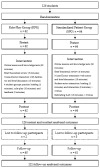Role-Play versus Standardised Patient Simulation for Teaching Interprofessional Communication in Care of the Elderly for Nursing Students
- PMID: 35052210
- PMCID: PMC8775804
- DOI: 10.3390/healthcare10010046
Role-Play versus Standardised Patient Simulation for Teaching Interprofessional Communication in Care of the Elderly for Nursing Students
Abstract
This study aims to describe and compare the effects of standardised patient simulation and role-play in the acquisition and retention of interprofessional communication in elderly care competence amongst nursing students. In this controlled clustered randomised trial, 121 nursing students attended a workshop on interprofessional communication in elderly care using role-play or standardised patient simulation. The study was conducted between September 2017 and February 2018. Participants' knowledge, self-efficacy and communication skills were assessed using a simulated scenario at pre-test, post-test and 6-week follow-up points. Between-subject and within-subject differences were measured using counts and proportions of participants who achieved competence. Regardless of the strategy applied, a significant improvement in knowledge, skills, self-efficacy and overall interprofessional communication competence was found between pre-test and post-test. Moreover, there were significant differences between pre-test and follow-up for all the studied variables, but no differences were found between post-test and follow-up. Lastly, when comparing the success rates of both strategies, no significant differences were observed (p > 0.05). In conclusion, standardised patient simulation and role-play have been shown to promote an improvement on knowledge, self-efficacy and interprofessional communication skills in nursing students, although it is not possible to state which strategy is the most adequate for teaching this competency.
Keywords: interprofessional communication; nursing; role-play; simulation; standardised patient.
Conflict of interest statement
The authors declare no conflict of interest.
Figures
Similar articles
-
Effect of two teaching methods on nursing students' acquisition of patient-centered communication competence in older people care: a cluster randomized trial.Front Public Health. 2024 Dec 23;12:1510620. doi: 10.3389/fpubh.2024.1510620. eCollection 2024. Front Public Health. 2024. PMID: 39764191 Free PMC article. Clinical Trial.
-
Efficacy of a Standardised Patient Simulation Programme for Chronicity and End-of-Life Care Training in Undergraduate Nursing Students.Int J Environ Res Public Health. 2021 Nov 6;18(21):11673. doi: 10.3390/ijerph182111673. Int J Environ Res Public Health. 2021. PMID: 34770187 Free PMC article.
-
An interprofessional communication training using simulation to enhance safe care for a deteriorating patient.Nurse Educ Today. 2014 Feb;34(2):259-64. doi: 10.1016/j.nedt.2013.02.019. Epub 2013 Mar 19. Nurse Educ Today. 2014. PMID: 23518067
-
Effectiveness of high fidelity simulation versus low fidelity simulation on practical/clinical skill development in pre-registration physiotherapy students: a systematic review.JBI Database System Rev Implement Rep. 2019 Jun;17(6):1229-1255. doi: 10.11124/JBISRIR-2017-003931. JBI Database System Rev Implement Rep. 2019. PMID: 30964770
-
Interprofessional simulation in undergraduate nursing program: An integrative review.Nurse Educ Today. 2018 Aug;67:46-55. doi: 10.1016/j.nedt.2018.05.001. Epub 2018 May 4. Nurse Educ Today. 2018. PMID: 29754113 Review.
Cited by
-
Teaching and Learning of Clinical Competence in Ghana: Experiences of Students and Post-Registration Nurses.Healthcare (Basel). 2022 Mar 15;10(3):538. doi: 10.3390/healthcare10030538. Healthcare (Basel). 2022. PMID: 35327016 Free PMC article.
-
The Spiritual Supporter Scale as a New Tool for Assessing Spiritual Care Competencies in Professionals: Design, Validation, and Psychometric Evaluation.J Relig Health. 2023 Jun;62(3):2081-2111. doi: 10.1007/s10943-022-01608-3. Epub 2022 Jul 26. J Relig Health. 2023. PMID: 35881265 Free PMC article.
-
Translating theory into practice: students' lived experiences on the utilization of OSVE and role-play for acquiring psychiatric nursing competencies.J Med Life. 2025 Apr;18(4):364-374. doi: 10.25122/jml-2024-0383. J Med Life. 2025. PMID: 40405937 Free PMC article.
-
"What is my initial impression of midwifery": a phenomenological study of first year student experiences after a redeveloped course.BMC Nurs. 2025 Jul 1;24(1):754. doi: 10.1186/s12912-025-03367-4. BMC Nurs. 2025. PMID: 40597239 Free PMC article.
-
Faculty standardized patients versus traditional teaching method to improve clinical competence among traditional Chinese medicine students: a prospective randomized controlled trial.BMC Med Educ. 2024 Jul 24;24(1):793. doi: 10.1186/s12909-024-05779-3. BMC Med Educ. 2024. PMID: 39049066 Free PMC article. Clinical Trial.
References
-
- Abd Hamid N.Z., Abdul Rasid S.Z., Maon S., Mohd Hassan N., Suddin L.S. Interprofessional Communication and Interprofessional Collaboration (IPC) among Health Care Professionals. Eur. Proc. Soc. Behav. Sci. 2016 doi: 10.15405/epsbs.2016.11.02.38. - DOI
-
- Watson J.B., Drulia T., Lynch L. Enhancing SLP Students’ Perceptions of Older Persons and Collaborative Practice through Geriatric Interprofessional Teamwork. Perspect. ASHA Spec. Interest Groups. 2021;6:941–954. doi: 10.1044/2021_PERSP-21-00011. - DOI
-
- Claramita M., Tuah R., Riskione P., Prabandari Y.S., Effendy C. Comparison of Communication Skills between Trained and Untrained Students Using a Culturally Sensitive Nurse–Client Communication Guideline in Indonesia. Nurse Educ. Today. 2016;36:236–241. doi: 10.1016/j.nedt.2015.10.022. - DOI - PubMed
Grants and funding
LinkOut - more resources
Full Text Sources


